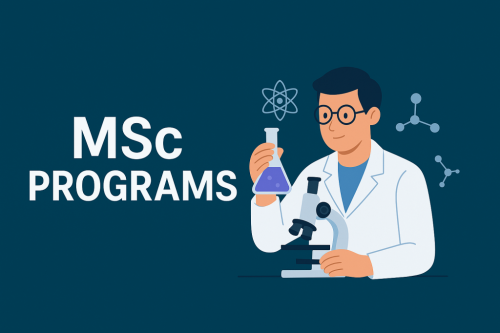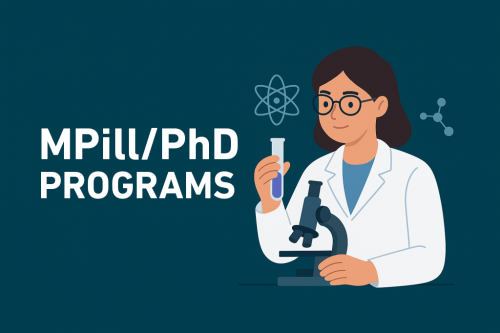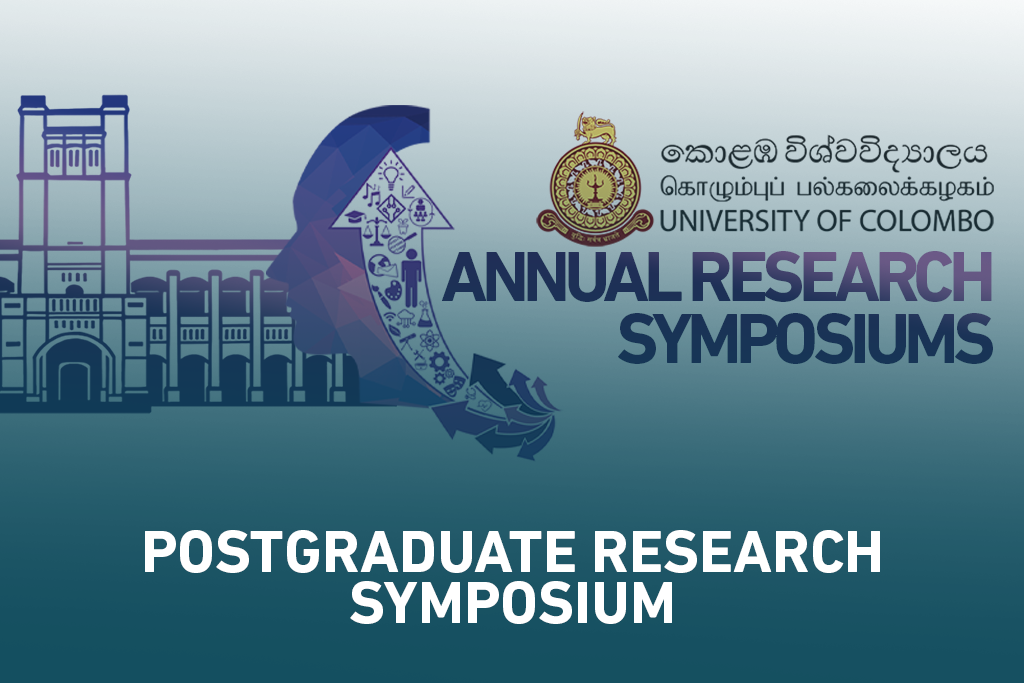Center for Postgraduate Studies (CPGS)
Welcome to the Center for Postgraduate Studies
The Faculty of Science at the University of Colombo currently offers more than 16 MSc programs. The increasing popularity of these postgraduate programs has led to a significant rise in student enrollment, driven by their quality. Given the robust demand for enrollment and the diverse range of program areas, it has become essential to closely oversee regular curriculum updates, program start dates, timely delivery, and successful completion.
Consequently, the university established the Center for Postgraduate Studies (CPGS) in 2023, aiming at enhancing the management to achieve these goals.
Why do you select the University of Colombo for your postgraduate degree?
The University of Colombo is the highest ranked University in Sri Lanka, particularly with respect to its research output. The Faculty of Science offers a range of diverse and comprehensive postgraduate programs to pursue advanced studies in the science streams.
Contact Us
Center for Postgraduate Studies
Faculty of Science
University of Colombo
Colombo 00300
Sri Lanka
Email: cpgs@sci.cmb.ac.lk
Apply Now – 2026 Intake
- Application deadline for the 2026 intake:
31st August 2025→ 15th September 2025 - Interviews for the 2026 intake: September 2025
- The final list of the 2026 intake: October 2025
- Registration of 2026 intake at CCUC: November 2025
- Inauguration of the program for 2026 intake: January 2026
- Commencement of the program for 2026 intake: January 2026
Apply Now – 2026 Intake
- Application deadline for the 2026 intake:
31st August 2025→ 15th September 2025 - Interviews for the 2026 intake: September 2025
- The final list of the 2026 intake: October 2025
- Registration of 2026 intake at CCUC: November 2025
- Inauguration of the program for 2026 intake: January 2026
- Commencement of the program for 2026 intake: January 2026
Objectives and Activities of CPGS
- Facilitate the overall coordination of postgraduate programs of the faculty,
- Strengthen the quality of the postgraduate programs offered by the faculty,
- Strengthen the existing postgraduate research collaborations and explore the possibilities of establishing new collaborations,
- Facilitate the dissemination of research findings by organizing research forums.
Functions of the CPGS
- Formulating and implementing policies with respect to the administration, conducting and monitoring of the postgraduate programs of the faculty.
- Aiding the Quality Assurance Cell of the faculty with respect to the quality enhancement of the postgraduate activities.
- Facilitating annual reviews and revisions of postgraduate programs.
- Maintaining the CPGS website and monitoring web-based services linked to the postgraduate programs of the faculty for enhanced visibility.
- Organizing training programs/workshops etc. for coordinators, teachers, and students on varied aspects related to the postgraduate programs.
- Facilitating research dissemination by organizing the Annual Research Symposium of the Faculty, and through other means.
Vision
To serve as an exemplary oversight body, offering precise guidance to individuals eager to make contributions to the scientific community, and to ensure that the finest individuals are directed toward the scientific and educational realms.
mission
To discover and disseminate knowledge under vigilant monitoring of a quality review process; enhance innovation; and promote a culture of extensive exploration throughout and beyond the faculty through the best practices and ethics.
Board Members
- Dean, Faculty of Science -Prof. Upul Sonnadara
- Director – Prof. C. D. Tilakaratne
- Deputy Director – Dr. Pradeepika Saputhanthri
Department Appointments:
- Chemistry – Dr. S. M. Vithanarachchi
- Mathematics Prof. S. S. N. Perera
- Nuclear Science – Prof. Jeyasingam Jeyasugiththan
- Plant Sciences – Dr. Sameera Ariyawansa
- Physics – Prof. Dilushan Jayasundara
- Statistics – Dr. Gayan Dharmarathne
- Zoology & Environment Sciences – Dr. Ayomi Witharana
- Senior Assistant Registrar, Faculty of Science
- Senior Assistant Bursar, Faculty of Science
We capitalize on our Strengths
Academic Excellence
A majority of the postgraduate courses are delivered by qualified, foreign-trained and experienced faculty members, while input from leading external experts is brought into enrich the study programs. Research is conducted under the close supervision and guidance of the academic staff who are well versed in cutting edge technologies and recent advances in their respective fields. Many academics have published extensively and are key personalities in science both locally and internationally.
Aptly Designed Curricula
The postgraduate programs have well-designed with multidisciplinary curricula that encompass a diverse array of fields and closely link both theory and practice. The courses aim to provide knowledge, insight and skills required to understand and solve critical global issues and fulfill national needs. Research degrees are intended to impart sound scientific knowledge and develop analytical skills in order to attain a high standard of professionalism and scholarship. Students are urged to embark on research projects that are novel, innovative, timely and intellectually challenging.
Strong Research Drive
Research has always been a focal point of the postgraduate programs offered by the Faculty of Science and continues to focus on producing new innovations and information which addresses current knowledge gaps and pressing national and global needs. Research is mostly multidisciplinary, and the high standard of research is evidenced by the volume of scientific publications in well cited and peer-reviewed local and international journals and the research awards and accolades received by the academics and their students. Many of the research findings have led to wide ranging impacts on industry, society, economy and the environment.
Local and Foreign Partnerships
Many faculty members have established collaborative research programs with overseas universities and have strong links with national research organizations through which they contribute to national development. Several members act as resource persons, consultants and board members in many government and non-government organizations. These links provide ample opportunities for collaborative work often facilitating foreign exposure.
Enhancement of Soft Skills
The programs offered by the faculty are also designed to enhance the inter-personal skills and higher order thinking skills of postgraduate students. Many opportunities are available for students to participate in academic and group discussions and to make oral and written presentations at local or international fora, particularly to disseminate research findings. The frequent postgraduate review sessions of the faculty provide a forum for students to obtain constructive feedback from a wide range of audience.
Frequently Asked Questions
Most of the necessary details are provided within the description of each study program. Students should contact the coordinators of the programs to get any additional details.
Our website will give details on the program that will be commencing soon. Once you access the particular program of interest, a google form / downloadable application form will be made available to you.
Students who wish to apply to a MPhil or PhD program should find an academic staff member who is willing to supervise you in the specific area of interest. The faculty website would give you details on the areas of expertise of the academic staff members. You may write directly to them. Financial support is sometimes available through research grants of the prospective supervisors. Once you select a supervisor you may apply for a research degree. Downloadable forms are available on the web.
Students who wish to apply to a MPhil or PhD program should find an academic staff member who is willing to supervise you in the specific area of interest. The faculty website would give you details on the areas of expertise of the academic staff members. You may write directly to them.
For MSc programs, the total cost is given within the MSc study program pages.
For research degrees the costs are – MPhil – Rs. 250,000 + Bench fees & PhD – Rs. 350,000 + Bench fees
The bench fee would vary depending on the research project that you intend to pursue.
We do not generally offer scholarships. But your supervisor may have a grant which could provide support.
Browse the Faculty of Science webpage for postgraduates. Most of the necessary details are provided within the description of each study program. Students could contact the coordinators of the programs to get any additional details. Contacts are provided on the program webpage.
Memorandum of understanding (MOU)
Industries are encouraged to request for collaborative development of new technologies. Such requests will be accepted depending on the infrastructure and the expertise available at the time. An MOU will be signed before the commencement of the project between the client and Cell.
Identifying intellectual property opportunities
The basic aim of the maintaining intellectual property policies is to promote the progress of science and technology, to assure that discoveries and inventions are used to benefit the public, to provide appropriate royalty revenues to the Cell and the inventor, and to support University research and education through the use of invention-related income. The Cell will grant to the sponsor, the right to negotiate an exclusive or nonexclusive license, based upon the level of sponsor support. In the event of a technology transfer, a payment should be paid to the Cell in order to transfer the technology.
Payments
Payments are negotiable as both direct and indirect costs are involved in some of these projects. All projects will require an advance payment to commence the work. On successful completion of the project, the outcome will be handed over upon receipt of the full payment. A technology transfer fee will be levied when transferring the technology. This will vary depending on the level of support obtained from the sponsor for the work done.
All Faculty of Science consultancy work can be handled through the “Cell”, which promotes the University’s consultancy capabilities to external parties.
The following outline is intended as a quick and easy guide when undertaking University consultancy. Consultancy is defined as the contracting of staff for a fixed short length of time, to carry out a task, other than research and development, specified by a client. Consultancy contracts differ from research contracts in that there is no academic output, such as publications in refereed journals. Lecturing and ad hoc interaction with media is excluded from these consultancy services.
Procedure
The following steps can be considered as guidance in undertaking a consultancy.
- Fill out the “Application for permission to undertake consultancy” form by the staff member wishing to undertake the consultancy. This application should be approved by the Head of the Department and the Dean, Faculty of Science. Application for permission to undertake consultancy
- Preparation of the budget by the staff member undertaking the consultancy prior to the commencement of the consultancy. The budget should be discussed with the Manager, “Cell”.
- Once the contract has been signed with the client, work can commence.
- The “Cell” should follow up on the progress of the work with the staff member undertaking the consultancy so as to ensure that the outcome of the project is delivered on time. Further, it is the responsibility of the “Cell” to obtain any advance payments from the client and/or the full payment from the client upon the completion of the consultancy.






